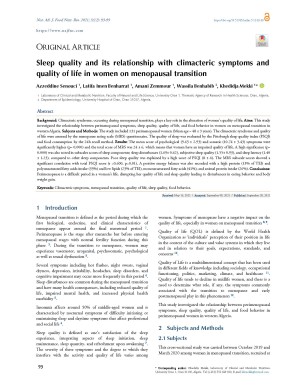Sleep quality and its relationship with climacteric symptoms and quality of life in women on menopausal transition
Abstract
Background: Climacteric syndrome, occurring during menopausal transition, plays a key role in the alteration of women's quality of life. Aims: This study investigated the relationship between perimenopausal symptoms, sleep quality, quality of life, and food behavior in women on menopausal transition in western Algeria. Subjects and Methods: The study included 131 perimenopausal women (Mean age = 48 ± 3 years). The climacteric syndrome and quality of life were assessed by the menopause rating scale (MRS) questionnaire. The quality of sleep was evaluated by the Pittsburgh sleep quality index (PSQI) and food consumption by the 24h recall method. Results: The mean score of psychological (9.63 ± 2.93) and somatic (10.74 ± 3.43) symptoms were significantly higher (p= 0.000) and the total score of MRS was 24 ± 6, which means that women have an impaired quality of life. A high significance (p= 0.000) was also noted in subscales scores of sleep components; sleep disturbances (1.69± 0.62), subjective sleep quality (1.55± 0.93), and sleep latency (1.40 ± 1.23), compared to other sleep components. Poor sleep quality was explained by a high score of PSQI (8 ± 4). The MRS subscale scores showed a significant correlation with total PSQI score (r =0.600, p=0.01). A positive energy balance was also recorded with a high protein (13% of TEI) and polyunsaturated fatty acids intake (33%) and low lipids (23% of TEI), monounsaturated fatty acids (41%), and animal protein intake (26%). Conclusions: Perimenopause is a difficult period in a woman's life, disrupting her quality of life and sleep quality leading to disturbances in eating behavior and body weight gain.
Full text article
Authors
Copyright (c) 2021 Authors

This work is licensed under a Creative Commons Attribution 4.0 International License.
-
Attribution — You must give appropriate credit, provide a link to the license, and indicate if changes were made. You may do so in any reasonable manner, but not in any way that suggests the licensor endorses you or your use.
-
No additional restrictions — You may not apply legal terms or technological measures that legally restrict others from doing anything the license permits.





